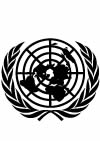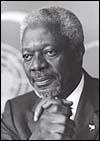For one hundred years, the Norwegian Nobel Committee has sought to strengthen organized cooperation between states. The end of the cold war has at last made it possible for the U.N. to perform more fully the part it was originally intended to play. Today the organization is at the forefront of efforts to achieve peace and security in the world, and of the international mobilization aimed at meeting the world's economic, social and environmental challenges. Kofi Annan has devoted almost his entire working life to the U.N. As Secretary-General, he has been pre-eminent in bringing new life to the organization. While clearly underlining the U.N.'s traditional responsibility for peace and security, he has also emphasized its obligations with regard to human rights. He has risen to such new challenges as HIV/AIDS and international terrorism, and brought about more efficient utilization of the U.N.'s modest resources. In an organization that can hardly become more than its members permit, he has made clear that sovereignty can not be a shield behind which member states conceal their violations. The U.N. has in its history achieved many successes, and suffered many setbacks. Through this first Peace Prize to the U.N. as such, the Norwegian Nobel Committee wishes in its centenary year to proclaim that the only negotiable route to global peace and cooperation goes by way of the United Nations. Oslo, 12 October, 2001 Norwegian Nobel Institute Drammensveien 19, N-0255 Oslo, Norway Website: www.nobel.no (Link to be opened in new window). |
|
BOES.ORG International Campaign to Ban Landmines (ICBL) ICBL NGO-links www.un.org |
Laureates 2004: Wangari Maathai. For her contribution to sustainable development, democracy and peace. She thinks globally and acts locally. 2003: Shirin Ebadi, Iran, 1947-. Lawyer and human rights activist, for her efforts for democracy and human rights. She has focused especially on the struggle for the rights of women and children. 2002: Jimmy Carter, USA, 1924-. For his decades of untiring effort to find peaceful solutions to international conflicts. 2001: The prize was divided equally between: The United Nations ( U.N.) and its Secretary-General, Kofi Annan, Ghana, 1938- For their work for a better organized and more peaceful world. 2000: Kim Dae Jung, Republic of Korea, 1925-. For his work for democracy and human rights in South Korea and in East Asia in general, and for peace and reconciliation with North Korea in particular. 1999: Doctors Without Borders (Médecins Sans Frontières) In recognition of the organisation's pioneering humanitarian work on several continents. 1998: The prize was divided equally between: John Hume, Northern Ireland, 1937-; and David Trimble, Northern Ireland, 1944-. For their efforts to find a peaceful solution to the conflict in Northern Ireland. 1997: The prize was divided equally between: International Campaign to Ban Landmines (ICBL) and Jody Williams, USA, 1950-. 1979: Mother Teresa, India, 1914-1997. Leader of the Order of the Missionaries of Charity. |
|
|

